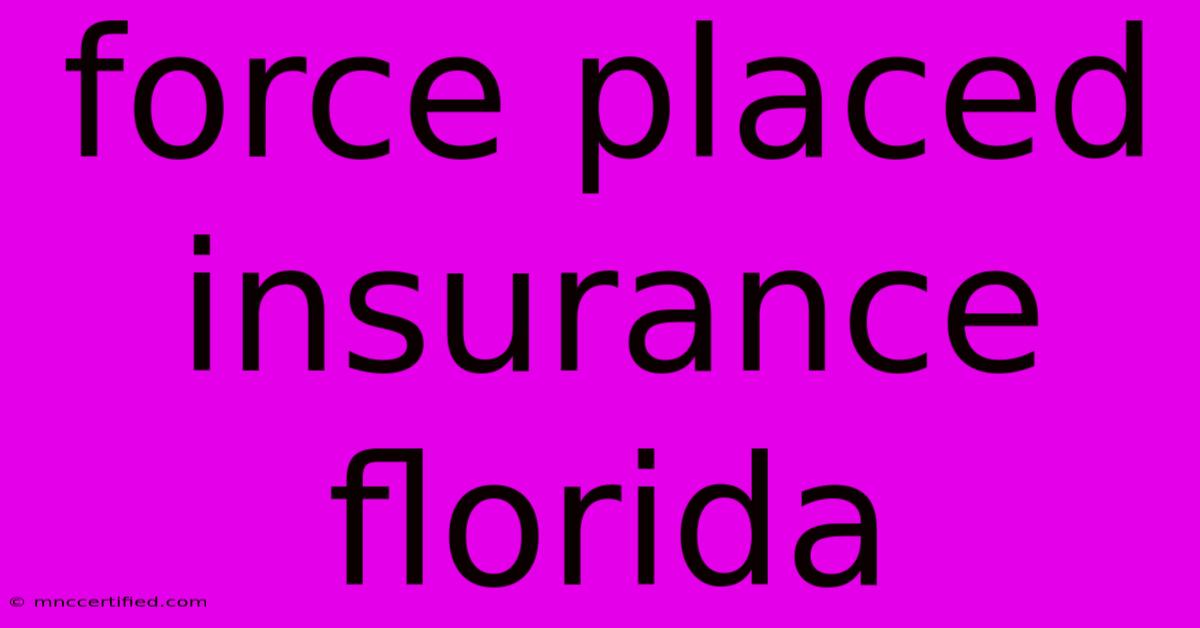Force Placed Insurance Florida

Table of Contents
Force-Placed Insurance in Florida: A Comprehensive Guide for Homeowners
Force-placed insurance, also known as lender-placed insurance, is a controversial topic in Florida. This comprehensive guide will explore what it is, when it's used, how it impacts homeowners, and how to avoid it. Understanding force-placed insurance is crucial for protecting your Florida property and your finances.
What is Force-Placed Insurance in Florida?
In Florida, like in other states, force-placed insurance is insurance purchased by your lender (typically a bank or mortgage company) when you fail to maintain homeowners insurance coverage on your property. This happens when your homeowner's insurance lapses, is canceled, or is deemed insufficient by your lender. The lender steps in to protect their financial interest in your property. Crucially, force-placed insurance policies are often significantly more expensive than policies purchased directly by homeowners.
Who is Affected?
Homeowners with mortgages are the primary targets of force-placed insurance. If you fail to maintain adequate homeowners insurance coverage, your lender has the right to purchase a policy on your behalf. This can occur for various reasons, including:
- Non-payment of premiums: The most common reason is simply failing to pay your homeowner's insurance premiums on time.
- Policy cancellation: Your insurance company cancels your policy due to non-payment or other violations of the policy terms.
- Insufficient coverage: Your lender deems your existing coverage inadequate to protect their investment. This could be due to insufficient dwelling coverage, a lack of liability coverage, or other deficiencies.
- Policy lapse: Your policy expires, and you haven't secured a new one before the expiration date.
The High Cost of Force-Placed Insurance in Florida
The primary issue with force-placed insurance is its exorbitant cost. These policies often come with significantly higher premiums than policies purchased directly from insurance companies. This is because lenders often contract with specialized insurance companies that charge premium rates, and these costs are passed directly onto the homeowner. The added expense can lead to substantial financial strain. You may find yourself paying hundreds, even thousands, more annually than if you had maintained your own policy.
How to Avoid Force-Placed Insurance in Florida
Preventing force-placed insurance is the best approach. Here's how to safeguard yourself:
- Pay your premiums on time: This is the most fundamental step. Set up automatic payments to avoid accidental lapses.
- Shop around for insurance: Compare quotes from multiple insurance providers to find the most competitive rates and coverage that meets your lender's requirements.
- Maintain adequate coverage: Ensure your policy provides sufficient coverage for your property's value and meets your lender's requirements. Regularly review your policy to ensure it's up-to-date.
- Review your policy regularly: Check your policy documents for expiration dates and any changes to your coverage.
- Communicate with your lender: If you anticipate difficulty paying your premiums, contact your lender immediately. They may be able to work with you to create a payment plan.
- Understand your lender's requirements: Clearly understand the specific insurance requirements outlined in your mortgage agreement.
Dispute Force-Placed Insurance Charges in Florida
If you believe you've been improperly charged for force-placed insurance, take the following steps:
- Review your mortgage documents: Carefully examine your mortgage agreement for details on insurance requirements.
- Gather documentation: Compile all relevant documentation, including your homeowner's insurance policy, lender communications, and any force-placed insurance invoices.
- Contact your lender: Attempt to resolve the issue directly with your lender, providing all supporting documentation.
- File a complaint: If your lender doesn't resolve the issue, you might need to file a complaint with your state's Department of Financial Services or the Consumer Financial Protection Bureau (CFPB).
Conclusion
Force-placed insurance in Florida can be a costly and frustrating experience. By proactively managing your homeowner's insurance and maintaining open communication with your lender, you can significantly reduce the risk of facing this unnecessary expense. Remember, proactive planning and diligent attention to your insurance needs are key to avoiding the pitfalls of lender-placed insurance. By understanding your rights and taking the necessary steps, you can protect your property and your financial well-being.

Thank you for visiting our website wich cover about Force Placed Insurance Florida. We hope the information provided has been useful to you. Feel free to contact us if you have any questions or need further assistance. See you next time and dont miss to bookmark.
Featured Posts
-
London Elizabeth Line Full Day Suspension
Nov 27, 2024
-
Egypt Tourist Boat Latest Rescues
Nov 27, 2024
-
Does Insurance Cover Retainers
Nov 27, 2024
-
Riverside Insurance Agency Inc
Nov 27, 2024
-
Councils 2025 26 Savings Options Launched
Nov 27, 2024